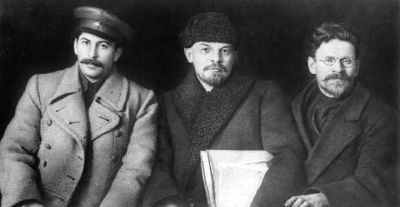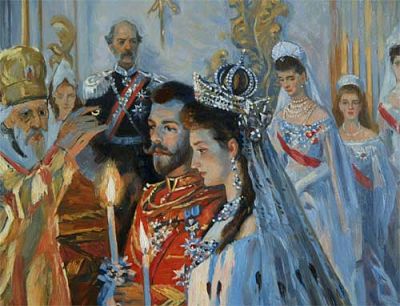Preface for those not reading Parts I, II, III
Cultures die quickly when they die. Great Britain was Christian until in a single decade it was not. Unlike the metaphorical frogs in hot water, but very much like the real ones, a society recognizes building problems and reacts well. “High” (complex) cultures have many resources to respond and decay is never even. We are more sexually confused and rotten than in some periods of the past in some ways, but not in other ways. For example, the sensible nature that humanity is male and female is under ideological attack, but the horrific notion of “marital” rape has been discarded.
Which is worse? We will see, but some things are better and some are worse. Sometimes a culture collapses and that is almost never good. The horror that comes out of the rebooted society makes the previous era look good in comparison. Kill Charles, get the joyless Cromwell. Behead Louis and bring on a Reign of Terror and the tyrant Napoleon. Execute Nicholas and end up with Lenin and Stalin.
Some problems are worse than other problems if we hope to muddle through our times . . . the best any Christian can hope to see before the coming of King Jesus. If we can do as well as my grandparents generation, beat the Depression, the Nazis, Jim Crow, the Soviets, then we will have done well. Did they leave us problems? Of course they did, but progress was made.

We can do as well, God helping us, but not if we make the errors that societies that collapse make. How do we avoid the errors? We can see what they are, but more important, we can stop whining and do something good. In Tsarist Russia there was great hope for a renewal of the nation. The economy was growing as was literacy. The arts were blossoming. There were problems, but the Constitution of 1905 held promise of better things to come. A reasonable person would have bet that the Tsar, who smoked like his English relatives, would die in a decade and leave the relatively moderate Michael the throne. (The heir had hemophilia.) A constitutional monarchy and a prosperous Orthodox state was very likely. Instead, very bad choices were made which, in combination with the outside pressures of World War I, led to total destruction of a better world and the birth of an uglier state.
One sign of doom is when “prudence” or “moderation” become swear words. The “middle” is a hard place to be, but it is the progressive conservative that keeps a culture alive. When the choice is between the mere reactionary or the revolutionary, it is too late. The assassination of a Peter Stolypin, who was opposed to revolution, but was also bringing change as the last great Tsarist Prime Minister, marked a troubling turn in Russian history.
We need slow, steady change, but we cannot get it if the center does not hold.
Death of the Middle: in Praise of Anthony Trollope
Anthony Trollope was a hardworking civil servant who was also one of the great novelists of the nineteenth century. He aspired to be part of the English establishment, but he also saw some rot in that establishment. He wanted change, but not at the cost of revolution like the one he saw destroy France. He loved old ways, sometimes merely because they were old, yet love meant accepting change.
Why?
In his best novels, Trollope shows English church and state as essentially sound. The landed gentry still contain some noble men and the church has genuine piety. Trollope also saw that new technology and new ideas meant that some of the old ways could not survive. It was the duty of those that loved the old ways to end them. Why? Because those who love a tradition can best honor what was good in that tradition and end what must be ended gently. What can be saved will be saved and so change will not be too quick and lead to destructive revolution.
The English people essentially heard this call in the nineteenth century and so social change was met by adaption. The monarchy and the best of the old order was preserved. England never fell into mob rule, but slowly the vote was extended, prosperity became more general, and social ills were ended. This conservative progressivism saved millions of lives by refusing to be reactionary or revolutionary.
The reactionary looks to a utopian past. The revolutionary to a utopian future. The progressive conservative simply wishes to make things better as he can without destroying the best of the old. Tyrants are born in the frustration with the inability of reaction or revolution to produce the promised paradise. The tyrant takes control of the city, the campus, or the church and tears down all the old buildings and puts up new monstrosities in his image. If he is a reactionary, he is slavish to old styles, but pumps them up to monstrous size: see Napoleon III and his Second Empire. If a revolutionary, he summons up brutal newness that is unlivable: the concrete structures that defaced ancient Moscow under Stalin.
The progressive conservative looks for the best of the new and incorporates it into the old. He knights the best pop musicians.
Progressive conservatism dies when replaced by utopianism, but that is not the greatest enemy. The worst thing that can happen is when money and consumption are made the greatest values. As pictured in the prophetic The Way We Live Now, money threatens to overturn the best of liberal and conservative values. The love of money is the root of all kinds of evil, but perhaps the greatest evil it does is push out greater loves. There is nothing wrong with money, it is a great blessing, but it is not a fit object for love. When money dominates, politics will become tyrannical in all parties.
Why?
The easiest way to sell a product in the short term is by an appeal to desire. Arguments are hard and emotions are easy. The thoughtful progressive or conservative will be shoved aside. As my friend philosopher JP Moreland says: “the makeup man becomes more important than the speech writer.” Celebrity also sells and so cults of personality will flourish as the love of money monetizes everything. This is the mega-church pastor latching on to phony book writing with ghost writers and dodgy degrees so that more ministry leads to more money.
This would be wrong, even if it worked, but it does not work. Over the long term, the love of money undermines faith in our great institutions. We know that power and money are great temptations, but we need some who will not bow the knee to give us hope.
I have personally found the love of money to be as great (if not greater) in those of us who do not have much as in those who have much. Some of the most generous people I know, selfless and quietly helpful, are people with wealth. I also know people who are generous with no money. The Constantine project would be impossible without both types of people.
The opposite of a love of money is to work hard, enjoy God’s blessing, and stop coveting what others have! We can love our neighbor, our family, our city, our state, our nation, and all humankind. Most of all, we love God and God’s church. We fight for what we love, but leave the outcome to God. God never loses and so we can have jollification in the midst of hard times.
Let’s Cheer Up, Let Go What Must Be Gone, and Fight for What Cannot Be Lost!
————————————-
This series is based on lectures prepared for The Saint Constantine School college program. It is part of the Constantine Strategy to serve our time with wisdom, virtue, and joy for Christ and His Church. I gave a shorter version of this talk to the Thrive Apologetics Conference. Part I, Part II, Part III, Part IV.
















